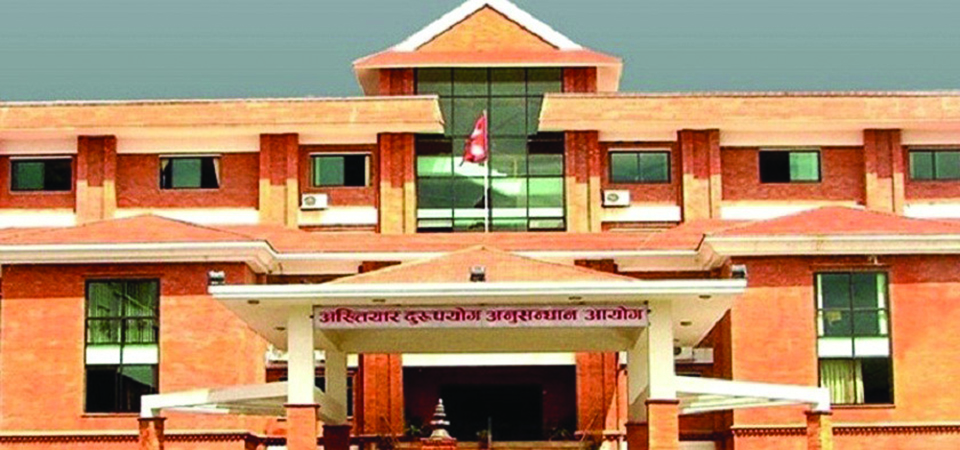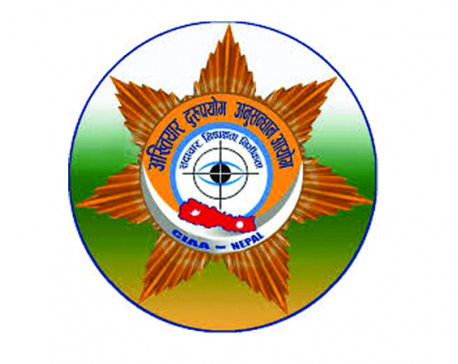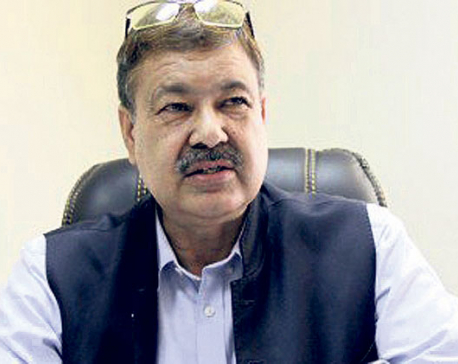
OR
Suicides by junior officials raises questions over CIAA probes
Published On: August 13, 2019 06:30 AM NPT By: Republica | @RepublicaNepal

Experts worry the corruption watchdog is giving the big fish a wide berth
KATHMANDU, Aug 13: As one after another junior government official commits suicide following implication by the CIAA, a debate has started whether such small fry is being made the scapegoats in various corruption scandals.
Non-gazetted government official Hari Prasad Acharya, a local of Udaypur, hanged himself from a tree on Saturday. In a suicide note, he has accused CIAA chief Nabin Kumar Ghimire of deliberately dragging him into controversy. The deceased man has claimed that he had no role in registering public land at Badbhanjyang as an individual property.
“I have not taken a single rupee as a bribe. But I am being accused of big-time graft,” he said. He also sarcastically wished CIAA chief Ghimire would live to be 200.
Acharya's is the third suicide case since July involving a government official.
In the last week of July, Yukta Prasad Shrestha, one of the accused in the Lalita Niwas land scam, apparently committed suicide following a repeated grilling by investigators from the CIAA. Shrestha was seen falling off a Balaju shopping mall and died while being taken to hospital.
A former non-gazetted officer who had spent years at the Dillibazaar Land Revenue Office, Shrestha was interrogated by the anti-graft body concerning the registering 114 ropani of government land in the names of various private individuals.
In the third week of July, Ram Bahadur Pandey, a former staffer at Tribhuvan University, jumped from the sixth floor of a house at Tripureshwar. Pandey and others at the Office of Controller of Examinations at Balkhu were accused of tinkering with the marks obtained by various students to land them gold medals.
In recent years, the CIAA has intensified its investigations. But it has mostly gone after lower-ranking bureaucrats instead of investigating high-profile officials and politicians. On average, the anti-graft body files two corruption cases a day, according to a recently released annual report.
As most of the defendants are junior officials, fingers of suspicion are now being pointed at the CIAA itself.
CIAA spokesperson Pradeep Kumar Koirala said, “We are not responsible for this. Once a case is filed in court we have no further role .”
Several high-profile corruption cases including the widebody jet purchase scam, Lalita Niwas land scam and Nepal Oil Corporation land scam are pending at the CIAA for months. Former prime minister Madhav Kumar Nepal and several former ministers and top bureaucrats are accused of involvement in registering the Lalita Niwas land in the name of various individuals.
In other similar scams, several top officials including former ministers were accused of embezzling Rs. 4.35 billion while procuring two wide-body aircraft for Nepal Airlines Corporation. However, no one has been interrogated or taken to court so far.
Asked why the CIAA is just praying on small fry and letting all the big fish off the hook, Koirala said they are still investigating the high-profile cases. But he declined to elaborate when the high-profiles will be booked. “Investigations are underway in various big corruption cases,” he quipped. Observers are not satisfied with the CIAA's stance. “Going through recent cases it seems the CIAA is trying to protect the political class. That's why they seem not focused on corruption cases involving politicians,” said Khem Raj Regmi, president of Transparency International Nepal.
Regmi argued that some low ranking officials were pressured to implement seriously flawed decisions. “Once they are dragged into the corruption story some of them felt disgraced in society and committed suicide,” said Regmi.
Implicating only lowly officials is the wrong approach because no big act of corruption is possible without the tripartite involvement of politicians, top bureaucrats and businesspersons, Regmi said.
You May Like This

Case filed against 13 immigration officers
KATHMANDU, Oct 22: The Commission for Investigation of Abuse of Authority (CIAA) has filed a case against 13 government officials... Read More...

CIAA sues ex-NOC chief Khadka over Rs 186m in unexplained wealth
KATHMANDU, Jan 8: The Commission for the Investigation of Abuse of Authority (CIAA) on Monday filed a corruption case against... Read More...

CIAA files illegal wealth amassing case against ex-chief Khadka
KATHMANDU, Jan 7: The Commission for the Investigation of Abuse of Authority (CIAA) has filed a case of illegal wealth... Read More...




Just In
- MoHP cautions docs working in govt hospitals not to work in private ones
- Over 400,000 tourists visited Mustang by road last year
- 19 hydropower projects to be showcased at investment summit
- Global oil and gold prices surge as Israel retaliates against Iran
- Sajha Yatayat cancels CEO appointment process for lack of candidates
- Govt padlocks Nepal Scouts’ property illegally occupied by NC lawmaker Deepak Khadka
- FWEAN meets with President Paudel to solicit support for women entrepreneurship
- Koshi provincial assembly passes resolution motion calling for special session by majority votes







_20220508065243.jpg)





Leave A Comment